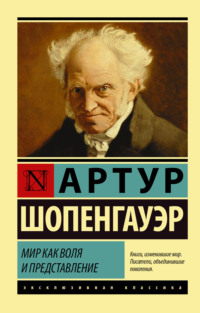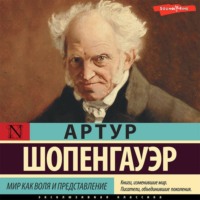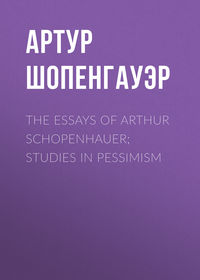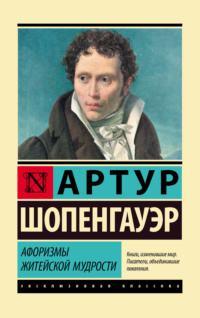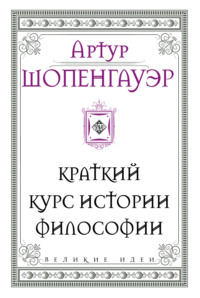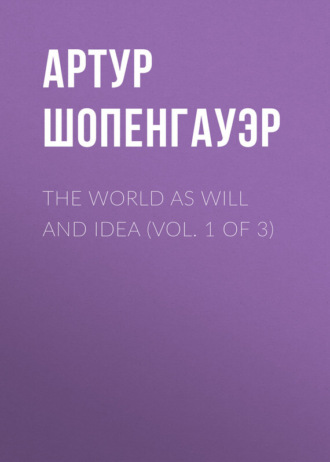 полная версия
полная версияThe World as Will and Idea (Vol. 1 of 3)
If, under the same circumstances, a man could act now one way and now another, it would be necessary that his will itself should have changed in the meantime, and thus that it should lie in time, for change is only possible in time; but then either the will would be a mere phenomenon, or time would be a condition of the thing-in-itself. Accordingly the dispute as to the freedom of the particular action, the liberum arbitrium indifferentiæ, really turns on the question whether the will lies in time or not. If, as both Kant's doctrine and the whole of my system necessitates, the will is the thing-in-itself outside time and outside every form of the principle of sufficient reason, not only must the individual act in the same way in the same circumstances, and not only must every bad action be the sure warrant of innumerable others, which the individual must perform and cannot leave, but, as Kant said, if only the empirical character and the motives were completely given, it would be possible to calculate the future conduct of a man just as we can calculate an eclipse of the sun or moon. As Nature is consistent, so is the character; every action must take place in accordance with it, just as every phenomenon takes place according to a law of Nature: the causes in the latter case and the motives in the former are merely the occasional causes, as was shown in the Second Book. The will, whose phenomenon is the whole being and life of man, cannot deny itself in the particular case, and what the man wills on the whole, that will he also will in the particular case.
The assertion of an empirical freedom of the will, a liberum arbitrium indifferentiæ, agrees precisely with the doctrine that places the inner nature of man in a soul, which is originally a knowing, and indeed really an abstract thinking nature, and only in consequence of this a willing nature – a doctrine which thus regards the will as of a secondary or derivative nature, instead of knowledge which is really so. The will indeed came to be regarded as an act of thought, and to be identified with the judgment, especially by Descartes and Spinoza. According to this doctrine every man must become what he is only through his knowledge; he must enter the world as a moral cipher come to know the things in it, and thereupon determine to be this or that, to act thus or thus, and may also through new knowledge achieve a new course of action, that is to say, become another person. Further, he must first know a thing to be good, and in consequence of this will it, instead of first willing it, and in consequence of this calling it good. According to my fundamental point of view, all this is a reversal of the true relation. Will is first and original; knowledge is merely added to it as an instrument belonging to the phenomenon of will. Therefore every man is what he is through his will, and his character is original, for willing is the basis of his nature. Through the knowledge which is added to it he comes to know in the course of experience what he is, i. e., he learns his character. Thus he knows himself in consequence of and in accordance with the nature of his will, instead of willing in consequence of and in accordance with his knowing. According to the latter view, he would only require to consider how he would like best to be, and he would be it; that is its doctrine of the freedom of the will. Thus it consists really in this, that a man is his own work guided by the light of knowledge. I, on the contrary, say that he is his own work before all knowledge, and knowledge is merely added to it to enlighten it. Therefore he cannot resolve to be this or that, nor can he become other than he is; but he is once for all, and he knows in the course of experience what he is. According to one doctrine he wills what he knows, and according to the other he knows what he wills.
The Greeks called the character ηθος, and its expression, i. e., morals, ηθη. But this word comes from εθος, custom; they chose it in order to express metaphorically the constancy of character through the constancy of custom. Το γαρ ηθος απο του εθους εχει την επωνυμιαν. ηθικε γαρ καλειται δια το εθιζεσθαι (a voce ηθος, i. e., consuetudo ηθος est appellatum: ethica ergo dicta est απο του εθιζεσθαι, sivi ab assuescendo) says Aristotle (Eth. Magna, i. 6, p. 1186, and Eth. Eud., p. 1220, and Eth. Nic., p. 1103, ed. Ber.) Stobæus quotes: οἱ δε κατα Ζηνωνα τροπικως; ηθος εστι πηγη βιου αφ᾽ ἡς αἱ κατα μερος πραξεις ρεουσι (Stoici autem, Zenonis castra sequentes, metaphorice ethos definiunt vitæ fontem, e quo singulæ manant actiones), ii. ch. 7. In Christian theology we find the dogma of predestination in consequence of election and non-election (Rom. ix. 11-24), clearly originating from the knowledge that man does not change himself, but his life and conduct, i. e., his empirical character, is only the unfolding of his intelligible character, the development of decided and unchangeable natural dispositions recognisable even in the child; therefore, as it were, even at his birth his conduct is firmly determined, and remains essentially the same to the end. This we entirely agree with; but certainly the consequences which followed from the union of this perfectly correct insight with the dogmas that already existed in Jewish theology, and which now gave rise to the great difficulty, the Gordian knot upon which most of the controversies of the Church turned, I do not undertake to defend, for even the Apostle Paul scarcely succeeded in doing so by means of his simile of the potter's vessels which he invented for the purpose, for the result he finally arrived at was nothing else than this: —
“Let mankindFear the gods!They hold the powerIn everlasting hands:And they can use itAs seems good to them.”Such considerations, however, are really foreign to our subject. Some explanation as to the relation between the character and the knowledge in which all its motives lie, will now be more to the point.
The motives which determine the manifestation of the character or conduct influence it through the medium of knowledge. But knowledge is changeable, and often vacillates between truth and error, yet, as a rule, is rectified more and more in the course of life, though certainly in very different degrees. Therefore the conduct of a man may be observably altered without justifying us in concluding that his character has been changed. What the man really and in general wills, the striving of his inmost nature, and the end he pursues in accordance with it, this we can never change by influence upon him from without by instruction, otherwise we could transform him. Seneca says admirably, velle non discitur; whereby he preferred truth to his Stoic philosophers, who taught διδακτην ειναι την αρετην (doceri posse virtutem). From without the will can only be affected by motives. But these can never change the will itself; for they have power over it only under the presupposition that it is precisely such as it is. All that they can do is thus to alter the direction of its effort, i. e., bring it about that it shall seek in another way than it has hitherto done that which it invariably seeks. Therefore instruction, improved knowledge, in other words, influence from without, may indeed teach the will that it erred in the means it employed, and can therefore bring it about that the end after which it strives once for all according to its inner nature shall be pursued on an entirely different path and in an entirely different object from what has hitherto been the case. But it can never bring about that the will shall will something actually different from what it has hitherto willed; this remains unchangeable, for the will is simply this willing itself, which would have to be abolished. The former, however, the possible modification of knowledge, and through knowledge of conduct, extends so far that the will seeks to attain its unalterable end, for example, Mohammed's paradise, at one time in the real world, at another time in a world of imagination, adapting the means to each, and thus in the first case applying prudence, might, and fraud, and in the second case, abstinence, justice, alms, and pilgrimages to Mecca. But its effort itself has not therefore changed, still less the will itself. Thus, although its action certainly shows itself very different at different times, its willing has yet remained precisely the same. Velle non discitur.
For motives to act, it is necessary not only that they should be present, but that they should be known; for, according to a very good expression of the schoolmen, which we referred to once before, causa finalis movet non secundum suum esse reale; sed secundum esse cognitum. For example, in order that the relation may appear that exists in a given man between egoism and sympathy, it is not sufficient that he should possess wealth and see others in want, but he must also know what he can do with his wealth, both for himself and for others: not only must the suffering of others be presented to him, but he must know both what suffering and also what pleasure is. Perhaps, on a first occasion, he did not know all this so well as on a second; and if, on a similar occasion, he acts differently, this arises simply from the fact that the circumstances were really different, as regards the part of them that depends on his knowing them, although they seem to be the same. As ignorance of actually existing circumstances robs them of their influence, so, on the other hand, entirely imaginary circumstances may act as if they were real, not only in the case of a particular deception, but also in general and continuously. For example, if a man is firmly persuaded that every good action will be repaid him a hundredfold in a future life, such a conviction affects him in precisely the same way as a good bill of exchange at a very long date, and he can give from mere egoism, as from another point of view he would take from egoism. He has not changed himself: velle non discitur. It is on account of this great influence of knowledge upon action, while the will remains unchangeable, that the character develops and its different features appear only little by little. Therefore it shows itself different at every period of life, and an impetuous, wild youth may be succeeded by a staid, sober, manly age. Especially what is bad in the character will always come out more strongly with time, yet sometimes it occurs that passions which a man gave way to in his youth are afterwards voluntarily restrained, simply because the motives opposed to them have only then come into knowledge. Hence, also, we are all innocent to begin with, and this merely means that neither we nor others know the evil of our own nature; it only appears with the motives, and only in time do the motives appear in knowledge. Finally we come to know ourselves as quite different from what a priori we supposed ourselves to be, and then we are often terrified at ourselves.
Repentance never proceeds from a change of the will (which is impossible), but from a change of knowledge. The essential and peculiar in what I have always willed I must still continue to will; for I myself am this will which lies outside time and change. I can therefore never repent of what I have willed, though I can repent of what I have done; because, led by false conceptions, I did something that was not in conformity with my will. The discovery of this through fuller knowledge is repentance. This extends not merely to worldly wisdom, to the choice of the means, and the judgment of the appropriateness of the end to my own will, but also to what is properly ethical. For example, I may have acted more egotistically than is in accordance with my character, led astray by exaggerated ideas of the need in which I myself stood, or of the craft, falseness, and wickedness of others, or because I hurried too much, i. e., acted without deliberation, determined not by motives distinctly known in abstracto, but by merely perceived motives, by the present and the emotion which it excited, and which was so strong that I had not properly the use of my reason; but the return of reflection is thus here also merely corrected knowledge, and from this repentance may proceed, which always proclaims itself by making amends for the past, as far as is possible. Yet it must be observed that, in order to deceive themselves, men prearrange what seem to be hasty errors, but are really secretly considered actions. For we deceive and flatter no one through such fine devices as ourselves. The converse of the case we have given may also occur. I may be misled by too good an opinion of others, or want of knowledge of the relative value of the good things of life, or some abstract dogma in which I have since lost faith, and thus I may act less egotistically than is in keeping with my character, and lay up for myself repentance of another kind. Thus repentance is always corrected knowledge of the relation of an act to its special intention. When the will reveals its Ideas in space alone, i. e., through mere form, the matter in which other Ideas – in this case natural forces – already reign, resists the will, and seldom allows the form that is striving after visibility to appear in perfect purity and distinctness, i. e., in perfect beauty. And there is an analogous hindrance to the will as it reveals itself in time alone, i. e., through actions, in the knowledge which seldom gives it the data quite correctly, so that the action which takes place does not accurately correspond to the will, and leads to repentance. Repentance thus always proceeds from corrected knowledge, not from the change of the will, which is impossible. Anguish of conscience for past deeds is anything but repentance. It is pain at the knowledge of oneself in one's inmost nature, i. e., as will. It rests precisely on the certainty that we have still the same will. If the will were changed, and therefore the anguish of conscience mere repentance, it would cease to exist. The past could then no longer give us pain, for it exhibited the expressions of a will which is no longer that of him who has repented. We shall explain the significance of anguish of conscience in detail farther on.
The influence which knowledge, as the medium of motives, exerts, not indeed upon the will itself, but upon its appearance in actions, is also the source of the principal distinction between the action of men and that of brutes, for their methods of knowledge are different. The brute has only knowledge of perception, the man, through reason, has also abstract ideas, conceptions. Now, although man and brute are with equal necessity determined by their motives, yet man, as distinguished from the brute, has a complete choice, which has often been regarded as a freedom of the will in particular actions, although it is nothing but the possibility of a thoroughly-fought-out battle between several motives, the strongest of which then determines it with necessity. For this the motives must have assumed the form of abstract thoughts, because it is really only by means of these that deliberation, i. e., a weighing of opposite reasons for action, is possible. In the case of the brute there can only be a choice between perceptible motives presented to it, so that the choice is limited to the narrow sphere of its present sensuous perception. Therefore the necessity of the determination of the will by the motive, which is like that of the effect by the cause, can be exhibited perceptibly and directly only in the case of the brutes, because here the spectator has the motives just as directly before his eyes as their effect; while in the case of man the motives are almost always abstract ideas, which are not communicated to the spectator, and even for the actor himself the necessity of their effect is hidden behind their conflict. For only in abstracto can several ideas, as judgments and chains of conclusions, lie beside each other in consciousness, and then, free from all determination of time, work against each other till the stronger overcomes the rest and determines the will. This is the complete choice or power of deliberation which man has as distinguished from the brutes, and on account of which freedom of the will has been attributed to him, in the belief that his willing is a mere result of the operations of his intellect, without a definite tendency which serves as its basis; while, in truth, the motives only work on the foundation and under the presupposition of his definite tendency, which in his case is individual, i. e., a character. A fuller exposition of this power of deliberation, and the difference between human and brute choice which is introduced by it, will be found in the “Two Fundamental Problems of Ethics” (1st edition, p. 35, et seq.; 2d edition, p. 34, et seq.), to which I therefore refer. For the rest, this power of deliberation which man possesses is one of those things that makes his existence so much more miserable than that of the brute. For in general our greatest sufferings do not lie in the present as ideas of perception or as immediate feelings; but in the reason, as abstract conceptions, painful thoughts, from which the brute, which lives only in the present, and therefore in enviable carelessness, is entirely free.
It seems to have been the dependence, which we have shown, of the human power of deliberation upon the faculty of abstract thinking, and thus also of judging and drawing conclusions also, that led both Descartes and Spinoza to identify the decisions of the will with the faculty of asserting and denying (the faculty of judgment). From this Descartes deduced the doctrine that the will, which, according to him, is indifferently free, is the source of sin, and also of all theoretical error. And Spinoza, on the other hand, concluded that the will is necessarily determined by the motives, as the judgment is by the reasons.71 The latter doctrine is in a sense true, but it appears as a true conclusion from false premises.
The distinction we have established between the ways in which the brutes and man are respectively moved by motives exerts a very wide influence upon the nature of both, and has most to do with the complete and obvious differences of their existence. While an idea of perception is in every case the motive which determines the brute, the man strives to exclude this kind of motivation altogether, and to determine himself entirely by abstract ideas. Thus he uses his prerogative of reason to the greatest possible advantage. Independent of the present, he neither chooses nor avoids the passing pleasure or pain, but reflects on the consequences of both. In most cases, setting aside quite insignificant actions, we are determined by abstract, thought motives, not present impressions. Therefore all particular privation for the moment is for us comparatively light, but all renunciation is terribly hard; for the former only concerns the fleeting present, but the latter concerns the future, and includes in itself innumerable privations, of which it is the equivalent. The causes of our pain, as of our pleasure, lie for the most part, not in the real present, but merely in abstract thoughts. It is these which are often unbearable to us – inflict torments in comparison with which all the sufferings of the animal world are very small; for even our own physical pain is not felt at all when they are present. Indeed, in the case of keen mental suffering, we even inflict physical suffering on ourselves merely to distract our attention from the former to the latter. This is why, in great mental anguish, men tear their hair, beat their breasts, lacerate their faces, or roll on the floor, for all these are in reality only violent means of diverting the mind from an unbearable thought. Just because mental pain, being much greater, makes us insensible to physical pain, suicide is very easy to the person who is in despair, or who is consumed by morbid depression, even though formerly, in comfortable circumstances, he recoiled at the thought of it. In the same way care and passion (thus the play of thought) wear out the body oftener and more than physical hardships. And in accordance with this Epictetus rightly says: Ταρασσει τους ανθρωπους ου τα πραγματα, αλλα τα περι των πραγματων δογματα (Perturbant homines non res ipsæ, sed de rebus decreta) (V.); and Seneca: Plura sunt quæ nos terrent, quam quæ premunt, et sæpius opinione quam re laboramus (Ep. 5). Eulenspiegel also admirably bantered human nature, for going uphill he laughed, and going downhill he wept. Indeed, children who have hurt themselves often cry, not at the pain, but at the thought of the pain which is awakened when some one condoles with them. Such great differences in conduct and in life arise from the diversity between the methods of knowledge of the brutes and man. Further, the appearance of the distinct and decided individual character, the principal distinction between man and the brute, which has scarcely more than the character of the species, is conditioned by the choice between several motives, which is only possible through abstract conceptions. For only after a choice has been made are the resolutions, which vary in different individuals, an indication of the individual character which is different in each; while the action of the brute depends only upon the presence or absence of the impression, supposing this impression to be in general a motive for its species. And, finally, in the case of man, only the resolve, and not the mere wish, is a valid indication of his character both for himself and for others; but the resolve becomes for himself, as for others, a certain fact only through the deed. The wish is merely the necessary consequence of the present impression, whether of the outward stimulus, or the inward passing mood; and is therefore as immediately necessary and devoid of consideration as the action of the brutes. Therefore, like the action of the brutes, it merely expresses the character of the species, not that of the individual, i. e., it indicates merely what man in general, not what the individual who experiences the wish, is capable of doing. The deed alone, – because as human action it always requires a certain deliberation, and because as a rule a man has command of his reason, is considerate, i. e., decides in accordance with considered and abstract motives, – is the expression of the intelligible maxims of his conduct, the result of his inmost willing, and is related as a letter to the word that stands for his empirical character, itself merely the temporal expression of his intelligible character. In a healthy mind, therefore, only deeds oppress the conscience, not wishes and thoughts; for it is only our deeds that hold up to us the mirror of our will. The deed referred to above, that is entirely unconsidered and is really committed in blind passion, is to a certain extent an intermediate thing between the mere wish and the resolve.
Therefore, by true repentance, which, however, shows itself as action also, it can be obliterated, as a falsely drawn line, from that picture of our will which our course of life is. I may insert the remark here, as a very good comparison, that the relation between wish and deed has a purely accidental but accurate analogy with that between the accumulation and discharge of electricity.
As the result of the whole of this discussion of the freedom of the will and what relates to it, we find that although the will may, in itself and apart from the phenomenon, be called free and even omnipotent, yet in its particular phenomena enlightened by knowledge, as in men and brutes, it is determined by motives to which the special character regularly and necessarily responds, and always in the same way. We see that because of the possession on his part of abstract or rational knowledge, man, as distinguished from the brutes, has a choice, which only makes him the scene of the conflict of his motives, without withdrawing him from their control. This choice is therefore certainly the condition of the possibility of the complete expression of the individual character, but is by no means to be regarded as freedom of the particular volition, i. e., independence of the law of causality, the necessity of which extends to man as to every other phenomenon. Thus the difference between human volition and that of the brutes, which is introduced by reason or knowledge through concepts, extends to the point we have indicated, and no farther. But, what is quite a different thing, there may arise a phenomenon of the human will which is quite impossible in the brute creation, if man altogether lays aside the knowledge of particular things as such which is subordinate to the principle of sufficient reason, and by means of his knowledge of the Ideas sees through the principium individuationis. Then an actual appearance of the real freedom of the will as a thing-in-itself is possible, by which the phenomenon comes into a sort of contradiction with itself, as is indicated by the word self-renunciation; and, finally, the “in-itself” of its nature suppresses itself. But this, the one, real, and direct expression of the freedom of the will in itself in the phenomenon, cannot be distinctly explained here, but will form the subject of the concluding part of our work.




